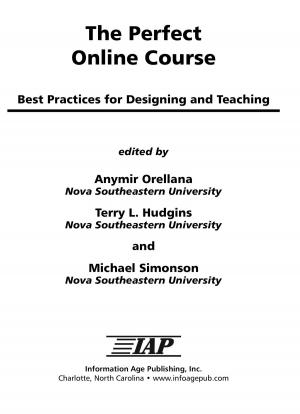| Author: | Bruce R. Ledford, Phillip J. Sleeman | ISBN: | 9781607527138 |
| Publisher: | Information Age Publishing | Publication: | April 1, 2001 |
| Imprint: | Information Age Publishing | Language: | English |
| Author: | Bruce R. Ledford, Phillip J. Sleeman |
| ISBN: | 9781607527138 |
| Publisher: | Information Age Publishing |
| Publication: | April 1, 2001 |
| Imprint: | Information Age Publishing |
| Language: | English |
The purpose of this book is to provide a superstructure within which one can design effective and efficient instruction, a system in which predictable and validatable learning will occur, a system in which one will be able to direct the learner’s activities toward a mutual goal in an environment of positive relationships. The purpose of this chapter is to provide an over view of the field of instructional technology, with specific focus on instructional design. The overview is eclectic; it presents views commonly held by instructional designers that have been synthesized from the research and literature. This book differs from most books on instructional design in that it describes a process that is internally consistent; that is, it embraces a specific approach which makes it possible and easier for the designer to achieve closure on a process. Most books on instructional design describe several processes without adequately providing an opportunity for closure. As a result, many designers go away confused, owning bits and pieces of a process that it is impossible, or at least difficult, to implement in a coherent fashion.
The purpose of this book is to provide a superstructure within which one can design effective and efficient instruction, a system in which predictable and validatable learning will occur, a system in which one will be able to direct the learner’s activities toward a mutual goal in an environment of positive relationships. The purpose of this chapter is to provide an over view of the field of instructional technology, with specific focus on instructional design. The overview is eclectic; it presents views commonly held by instructional designers that have been synthesized from the research and literature. This book differs from most books on instructional design in that it describes a process that is internally consistent; that is, it embraces a specific approach which makes it possible and easier for the designer to achieve closure on a process. Most books on instructional design describe several processes without adequately providing an opportunity for closure. As a result, many designers go away confused, owning bits and pieces of a process that it is impossible, or at least difficult, to implement in a coherent fashion.















